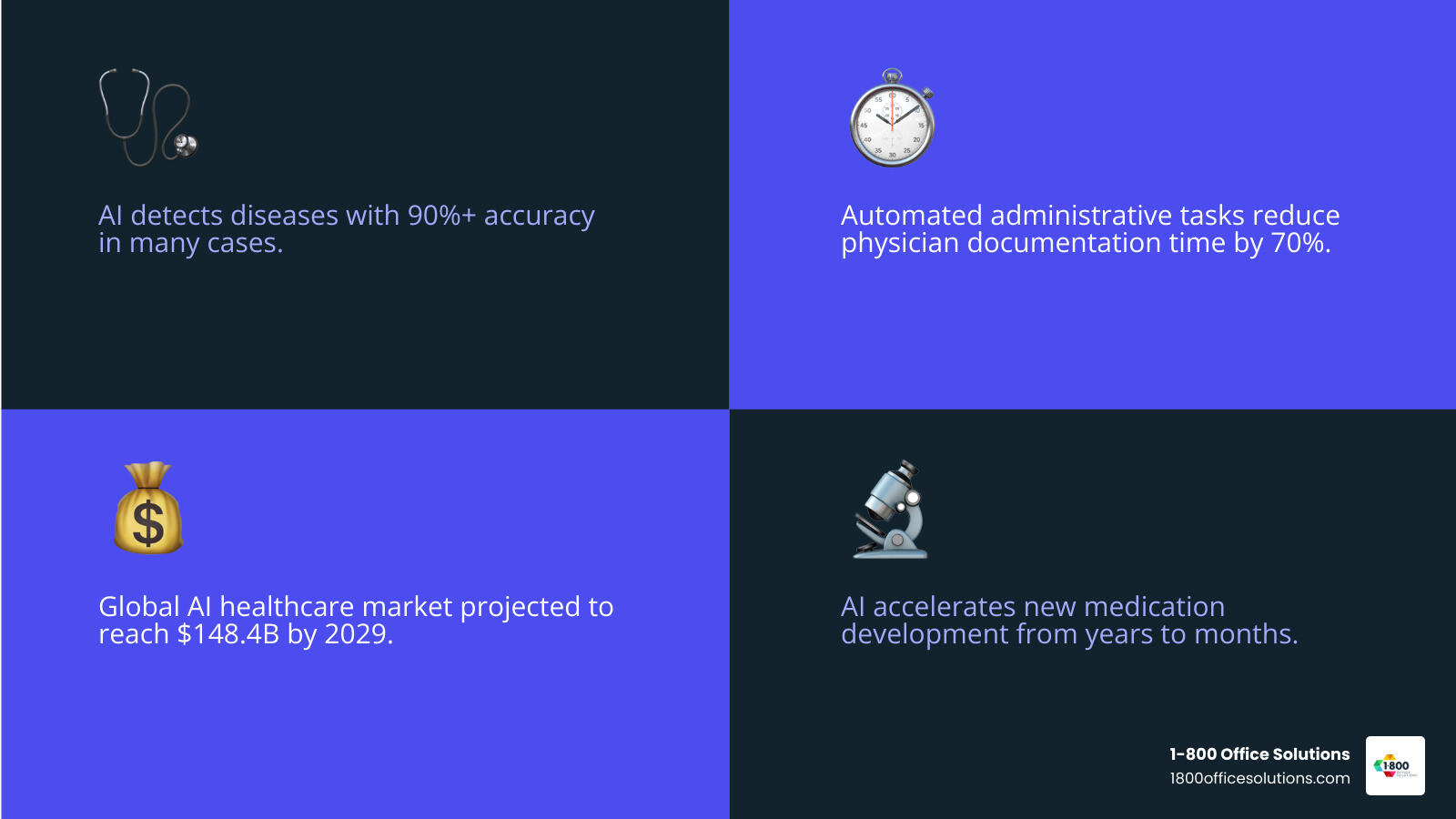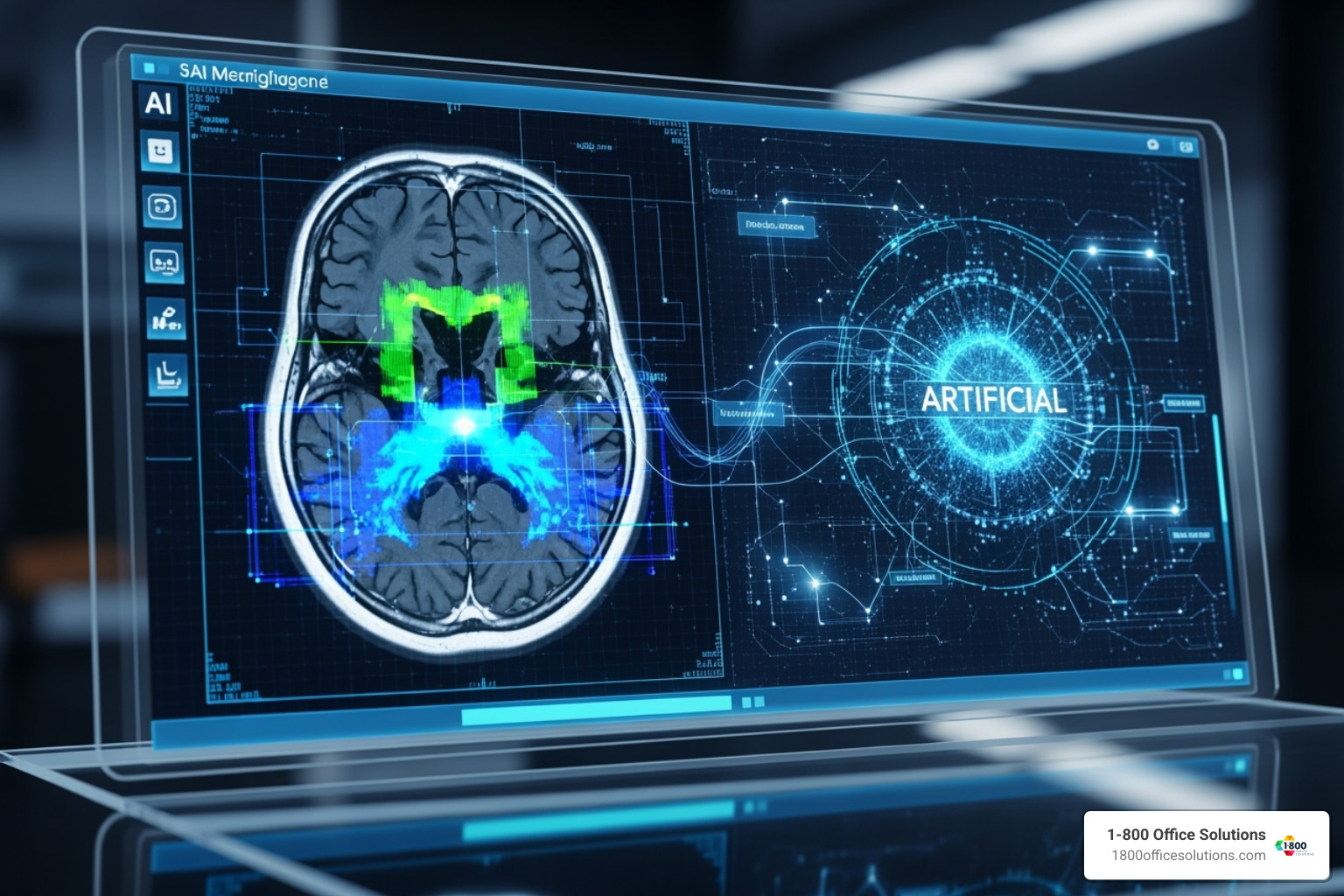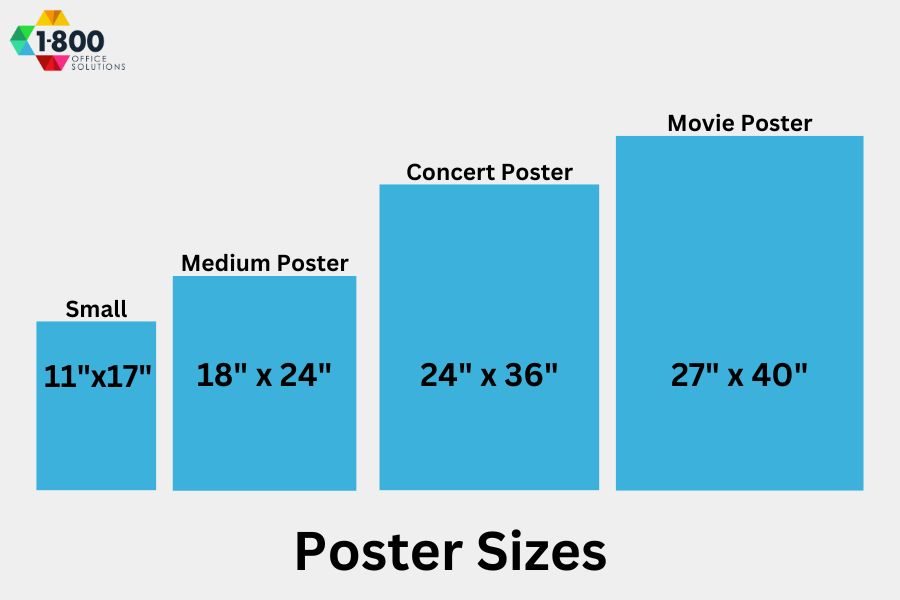Healthcare 2.0: The Future of AI in Medicine
Why the Future of AI in Healthcare Matters Now
The future of ai in healthcare is changing medicine at an unprecedented pace, with AI solutions already improving patient outcomes and streamlining hospital operations. Here’s what’s coming:
Key AI Changes in Healthcare:
- Diagnostics: AI detects diseases earlier with 90%+ accuracy in many cases
- Treatment: Personalized medicine based on individual genetic profiles
- Operations: Automated administrative tasks reduce physician documentation time by 70%
- Drug Findy: AI accelerates new medication development from years to months
- Patient Care: 24/7 virtual assistants and remote monitoring capabilities
Healthcare systems face mounting pressure from aging populations and workforce shortages. With 4.5 billion people lacking access to essential healthcare services and an expected health worker shortage of 11 million by 2030, AI isn’t just an upgrade—it’s becoming essential.
The global AI healthcare market is projected to explode from $20.9 billion in 2024 to $148.4 billion by 2029, a staggering 48% annual growth rate. This reflects heavy investment from healthcare systems in solutions that work.
This revolution isn’t about replacing doctors and nurses. Instead, AI is giving them superpowers—an ultimate assistant that processes millions of data points instantly, helping human expertise reach more patients than ever.
The question isn’t whether AI will change healthcare—it’s how quickly your organization can adapt to provide the best possible care.

Quick future of ai in healthcare definitions:
- 5 applications of ai
- Pros and cons of facial recognition
- Will AI replace jobs: 9 job types that might be affected
The AI Revolution in Clinical Practice: Enhancing Diagnostics and Treatment
The future of ai in healthcare is happening now in hospitals and clinics. Simple automation has evolved into AI systems that spot diseases earlier than doctors, predict health problems, and help create personalized treatments.
Think of AI as the ultimate medical detective that never gets tired, analyzes millions of data points in seconds, and catches subtle clues physicians might miss. A report from the National Academy of Medicine identifies key benefits seen in medical settings daily: improved patient outcomes, increased efficiency, and breakthrough research capabilities.
The impact spans three major areas: patient-oriented applications for diagnosis and treatment, clinician-oriented tools to support daily work, and administrative systems for smooth operations.

AI-Powered Diagnostics: Seeing the Unseen
Imagine a medical assistant that examines thousands of X-rays, MRIs, and CT scans in the time it takes to grab a coffee. That’s what’s happening in radiology, cardiology, and pathology departments.
In radiology, AI is a game-changer for early disease detection. AI can complete time-consuming work for radiology professionals, like analyzing kidney images for total kidney volume. What used to take radiologists 45 minutes now happens in seconds. This frees them up to focus on complex cases and spend more time with patients.
The results speak for themselves. In a Mayo Clinic cardiology study, AI identified at-risk patients for heart dysfunction using standard ECGs, catching heart problems before they become life-threatening.
Even routine procedures are getting smarter. AI can improve colonoscopy accuracy by helping doctors spot polyps that might otherwise be missed. Catching diseases earlier leads to better patient outcomes and lower healthcare costs.
The Dawn of Personalized and Preventive Medicine
Here’s where the future of ai in healthcare gets really exciting. We’re moving from a “one-size-fits-all” approach to medicine. Instead, AI helps doctors create treatments custom to each person’s unique genetic makeup, lifestyle, and environmental factors.
Your smartwatch, fitness tracker, and smartphone are becoming powerful health monitors. AI analyzes data from these wearable devices, your genomics information, and medical history to create detailed risk assessments. It’s like a crystal ball that can predict health problems years in advance.
A breakthrough study shows that a new AI model can detect the presence of certain diseases before symptoms appear, opening up unprecedented opportunities for preventive medicine. Instead of waiting until you’re sick, doctors can intervene early when treatments are most effective.
Applications extend to public health monitoring too. During the COVID-19 pandemic, AI systems analyzed social media and search trends to predict disease outbreaks. Mayo Clinic hopes AI will create new ways to diagnose, treat, predict, prevent, and cure disease, pushing the boundaries of medicine.
Accelerating Pharmaceutical Research
The traditional drug findy process is slow and expensive, typically taking 10-15 years and billions of dollars. AI is changing this equation.Protein structure prediction, clinical trial matching, and drug repurposing are all getting major AI upgrades. Instead of testing thousands of compounds in labs, AI can simulate molecular interactions digitally, dramatically speeding up the identification of promising drug candidates.McKinsey research
shows AI can be beneficial for finding new drug compounds, potentially contributing $100 billion annually to the US healthcare system from pharmaceutical advances alone.
Clinical trials are also getting smarter. AI analyzes patient data to quickly identify eligible participants, solving a major bottleneck in drug development. Faster recruitment means life-saving treatments reach patients sooner.
The ripple effects are enormous. When AI predicts which existing drugs might work for new diseases, we can repurpose medications that have already proven safe. This shortcut could bring treatments to patients in months instead of years.
Streamlining Healthcare Operations: The Future of AI in Healthcare Administration
Beyond diagnostics, AI is making a massive difference in healthcare administration. The paperwork, complex billing, and juggling of staff and supplies can be overwhelming. The future of AI in healthcare is stepping in to make these operations smoother and more efficient, freeing up precious time for patient care.

Reducing the Burden of Administrative Tasks
Healthcare professionals spend too much time on administrative tasks. A doctor might spend 16 minutes per patient on electronic health records (EHRs) alone. This leads to clinician burnout and takes away from patient care.
The good news is that AI, using Natural Language Processing (NLP) and Machine Learning (ML), is becoming the ultimate administrative assistant, automating many time-consuming tasks.
For clinical documentation, AI can help with the often tedious work of writing clinical notes. It can listen to doctor-patient conversations, transcribe them, and extract key information, cutting documentation time by up to 70%. Tools like Microsoft’s Dragon Copilot already help clinicians focus on patients, not screens.
For medical coding and billing, AI automates the complex process, reducing errors and speeding up claims. This means providers get paid faster and patients have a clearer billing experience.
For appointment scheduling and patient triage, AI-powered chatbots can answer questions, book appointments, and assess symptom urgency. This reduces staff workload and improves patient access.
By handling these repetitive jobs, AI improves life for healthcare staff, allowing them to focus on providing human-centered care.
Optimizing for Value-Based Care and Efficiency
Healthcare is shifting towards value-based care, where providers are paid for good patient outcomes, not just the number of services. This change requires smart data analysis and efficient operations, where AI excels.
AI helps healthcare organizations achieve the ‘Quadruple Aim’: better population health, an improved patient experience, better caregiver well-being, and lower costs. Here’s how:
- Patient flow management: AI uses real-time data to ensure patients move smoothly through hospitals, which means shorter wait times and better use of beds.
- Supply chain optimization: AI predicts supply needs, manages inventory, and spots potential disruptions, ensuring vital resources are always available.
- Healthcare fraud detection: AI is a powerful tool against fraud, which costs billions annually. It analyzes billing claims to find and flag suspicious patterns.
- Staffing models: AI analyzes patient volume and acuity to create optimal staff schedules, ensuring adequate care while controlling costs.
While this efficiency is exciting, AI needs careful handling, especially in sensitive areas like payments. We’ve seen cases where algorithms used by some plans can deny payments. This highlights the need for strong ethical rules and human oversight. The goal is to use AI to make healthcare more efficient without sacrificing excellent patient care or fairness.
While the promise of the future of AI in healthcare is exciting, we must address its challenges and ethical considerations. AI carries risks like data privacy concerns, algorithmic bias, and regulatory problems that need careful management for responsible deployment. Implementing AI correctly means navigating a complex ethical landscape to ensure it serves all patients fairly and safely.
Addressing Bias and Promoting Health Equity
One of the most pressing challenges is algorithmic bias. If AI models learn from incomplete or biased data, they won’t work for everyone. The problem is serious when AI trained only on people who can access healthcare performs poorly for underserved populations. This can widen health disparities.
The solution requires a commitment to data diversity—ensuring AI models are trained on data reflecting all patient populations. This means partnering with underrepresented communities and continuously testing AI performance across different groups. AI must work for all patients, not just some.
Encouragingly, AI can promote equity when designed thoughtfully. Google added a feature to help users steer Medicaid reenrollment, showing how AI can address access challenges. When we prioritize socioeconomic factors and algorithmic fairness, AI can reduce health disparities.
The Critical Role of Regulation and Data Privacy
Healthcare data is extremely sensitive, and protecting it is legally and morally essential. As AI processes vast patient data, HIPAA compliance becomes more complex but no less critical. Every algorithm and automated decision must meet the same privacy standards as human providers.
The challenge intensifies with “black box” AI systems, whose decision-making processes are opaque. This creates concerns about patient consent and data security. How can patients consent if we can’t explain how their data is used?
Regulatory bodies are catching up. In the US, the FDA has examined the regulation of AI in healthcare, recognizing the need for clear guidelines. This is essential protection to ensure AI tools undergo rigorous testing like any medical intervention.
The challenge is global, so international cooperation is crucial. The World Economic Forum’s AI Governance Alliance promotes responsible AI development worldwide. This collaborative approach recognizes that AI governance must be as borderless as the technology itself.
The path forward requires balancing innovation with protection. For healthcare organizations, this means investing in regulatory oversight, cybersecurity measures, and ethical frameworks to deploy AI safely.
Preparing for an AI-Augmented Future: A Roadmap for Healthcare Organizations
The future of AI in healthcare is happening now. Smart organizations are laying the groundwork, as jumping into AI without preparation is like building a house without a foundation.
The good news is that change can be gradual. Successful AI implementation happens step-by-step, with a clear understanding that AI isn’t intended to replace humans but to augment their capabilities—giving your team superpowers, not replacing them.

Building a Foundation for AI Integration
Before using AI’s potential, you need a rock-solid digital infrastructure. Data quality is critical because AI is only as good as its data. Incomplete or inconsistent electronic health records will lead to inaccurate AI insights. A robust digital foundation requires strong data governance to ensure patient information is clean, complete, and organized.
Your IT infrastructure must handle AI’s computational demands. Many organizations use cloud computing for its scalability and flexibility. As you expand digital capabilities, cybersecurity becomes even more crucial to protect both patient data and the decision-making systems.
Interoperability is key to open uping AI’s full potential. When different systems can’t communicate, AI gets a fragmented patient picture. Breaking down data silos through interoperability standards allows AI to see the complete story and provide more valuable insights.
Cultivating a Future-Ready Workforce
Your people are the most important piece of the puzzle. The future of AI in healthcare depends on professionals who know how to work alongside these powerful tools.
Digital literacy doesn’t mean turning doctors into programmers. It means helping your team understand what AI can and can’t do, how to interpret its recommendations, and when to trust human judgment over algorithms. It is important that users understand and know how to mitigate risks from technology, especially in healthcare.
The focus should be on augmented intelligence—using AI to make your workforce more effective. This is vital given the expected health worker shortage of 11 million globally by 2030. AI can help your current team do more and provide better care to more patients.
Training and upskilling programs must be part of your organizational DNA. This is an ongoing commitment to helping your team grow with the technology. Some organizations are creating new roles like clinical data scientists to bridge the gap between healthcare and AI.
Successful organizations approach AI as a team sport, fostering collaboration between clinicians, IT professionals, and AI specialists. When your team works together to fine-tune AI solutions for real clinical problems, that’s when the magic happens.
Frequently Asked Questions about the Future of AI in Healthcare
Healthcare professionals and patients alike have concerns about how artificial intelligence will reshape medical care. Let’s address the most common questions about the future of AI in healthcare with straightforward answers.
Will AI replace doctors and other healthcare professionals?
This is a common worry, but the reassuring truth is that AI isn't coming for healthcare jobs. Instead, it's an incredibly smart assistant for medical professionals.
AI excels at crunching massive amounts of data and spotting patterns, freeing up doctors and nurses from repetitive tasks. This allows them to focus on what they do best: providing compassionate care, making complex clinical decisions, and connecting with patients.
The American Medical Association calls this approach "augmented intelligence." It's about improvement, not replacement. A radiologist using AI can review scans faster and catch subtle abnormalities, but they remain the expert making the final diagnosis and explaining it to patients.
What are the biggest risks of using AI in a medical setting?
The primary concerns include algorithmic bias that could worsen health disparities, especially if AI systems are trained on non-diverse data.
Patient data privacy and security are also significant challenges. As AI processes sensitive health information, the impact of a data breach is enormous. Organizations must implement robust cybersecurity and comply with regulations like HIPAA.
There's also the "black box" problem, where some AI models make decisions that are not fully explainable. This lack of transparency is problematic in healthcare, where understanding the reasoning is crucial.
Finally, there's the potential for diagnostic errors if AI systems aren't properly validated or if providers become over-reliant on them. Strong regulatory oversight, comprehensive testing, and human supervision are essential.
How can AI improve a patient's experience?
The future of AI in healthcare is exciting for patients. Imagine personalized treatment plans custom to your genetic makeup, medical history, and lifestyle. AI makes this possible by analyzing patterns across millions of cases.
24/7 virtual health assistants can answer basic health questions and help manage medications. For patients with chronic conditions, remote monitoring via wearable devices allows for care from home.
AI also speeds up diagnostic processes, providing faster diagnostic results and reducing the anxiety of waiting.
Behind the scenes, AI streamlines administrative tasks. This means fewer delays and more time for your doctor to spend with you, focusing on your concerns and providing the personalized attention that makes all the difference.
Conclusion
The future of AI in healthcare isn’t a far-off dream; it’s happening now, changing how we approach patient care and operations. We’ve seen how AI is supercharging everything from pinpointing diseases earlier to making daily hospital tasks run smoother. The big takeaway? AI promises to create a healthcare system that’s more effective, efficient, and fair.
The real magic happens when AI works with people, not instead of them. It’s about augmented intelligence, where powerful technology supports the expertise of doctors and nurses. This partnership frees up healthcare professionals from tedious work, allowing them to focus on what truly matters: providing compassionate, high-quality care.
For healthcare organizations to accept this potential, building a strong technological foundation is key. A secure and scalable IT infrastructure is the backbone that ensures smooth AI integration, safe data management, and ultimately, greater healthcare efficiency.
As the healthcare landscape evolves, integrating AI is essential for staying competitive and delivering the best patient outcomes. Ready to prepare your organization for this exciting future? Learn more about our Managed IT Services and how we can support your journey into the AI-augmented world of healthcare.











